Editor’s Note: This article was the most read of 2021 because, we believe, our long-pent-up wanderlust needs an outlet. With all the interest in the Inca Trail, we have put together a 8-day, 7-night trip to Peru, Oct. 2-9, 2022, that includes 4 days and 3 nights hiking the Inca Trail to Machu Picchu. Click here for all the details.
***
On the night before we were to leave on a four-day hike to Machu Picchu, the 14 of us making the trip—including my husband, me, and our two sons—crammed into a small office in the center of Cusco, Peru. We were here to meet our guides from our tour company, SAS, for the upcoming trek, the people who would be setting up our camps at night, feeding us, making sure we didn’t get lost in the Andes.
The guides had a lot to tell us. How much the packs we gave the porters to carry could weigh (20 of them were assigned to lug our bags, set up camp, and cook our meals). How to deal with the high altitude (chewing on coca leaves we’d be provided). How we would be using the bathroom on the hike (don’t ask).
Why were the guides looking at me like that? I wouldn’t find out till the last night of our hike, and it wasn’t complimentary.
In the midst of the meeting, I felt the two guides—Vincente and Oscar—looking at me strangely. Years earlier, I might have thought they were making googly eyes at me. I might have been flattered. But at the time I was 49. They were obviously in their early 30s. Their looks were not flirtatious. But what? I wouldn’t find out till the last night of our hike, and it wasn’t complimentary.
Someone in the group asked how hard the trek would be (I was so pleased I hadn’t been the one scaredy-cat to ask), and Vincente and Oscar assured us that it wouldn’t be too difficult, reporting that tens of thousands of hikers complete the 26 mile route every year.
“You can do it. We’ll make sure of that,” Vincente, the lead guide, assured us.
Looking around the room, I realized all the other trekkers were young couples, and I later noticed on one of the guide’s documents that two trekkers’ names were crossed off.
“What happened to them?” I asked.
“They said they were worried about making it the whole way with the altitude,” Vincente reported. Upon further inspection, I saw that their birthdates were 1957. They were three years older than me and they’d dropped out, and it dawned on me that this made me the oldest trekker on the hike (my husband is two years younger than I am).
That night I went to bed wondering why I hadn’t done more research on the rigors of the hike.
Please Don’t Let Me Be the Turn-Around Lady
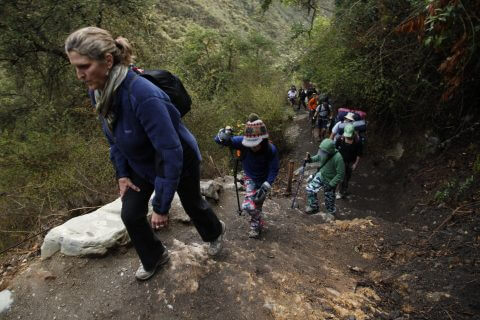
Our first day was relatively easy; we went from 8,900 feet to 10,800 feet, walking along a dirt path past local Andean people—many of the women wearing the traditional full skirts, striped shawls and felt fedoras—who use the trail as a lifeline to the outside world. But it was capped off by a pretty steep uphill for about an hour.
For much all of the incline I was breathing like an obscene phone caller, even though I was just carrying a small backpack with items I needed immediately. The poor porters were hauling packs as big as VW Beetles. What a wimp I was. Knowing the next day was going to be even more demanding than this climb, I began to worry.
For much of the incline I was breathing like an obscene phone caller, even though I was just carrying a small backpack.
That night, camped out in a tent with my son Jeb, 10 at the time, I had trouble sleeping even though I was exhausted. Had I over-estimated my stamina? I was in decent shape. I ran a couple of miles four times a week. I had trekked in the Himalayas with my husband Robb for five weeks, but that was when I was 30 years old. Before kids. Before knees and lungs and who knows what else had started to rebel and undermine me.
I finally slept and woke up with renewed determination to face our biggest test of the hike: the 14,200-feet high, ominously named Dead Woman’s Pass, followed by a downhill and then another climb to 13,100 feet before getting to that night’s camp. My confidence only lasted until we met up with a woman—about my age—who was heading in the opposite direction on the trail with a guide just behind her. She was from a different expedition—the Inca Trail has about 200 paying trekkers starting the route per day, all traveling with various companies.
“Where you going?” I asked cheerily.
“Bad night. Can’t do. Altitude,” she answered before rushing off, as if Colin Firth was waiting for her at lower ground.
I quizzed Oscar, our other guide, about her condition. He told me that this happens often. Someone can’t make it and they have to be walked back to the starting point. They are put up in a hotel and a bus usually takes them to Machu Picchu so they can meet their group there later. Oh the shame. The pressure. They didn’t tell us this at the orientation meeting. God, I hoped that would not be me.
Read More: Camino de Santiago: The Walk That Changed an Empty Nester’s Life
The Dead Woman
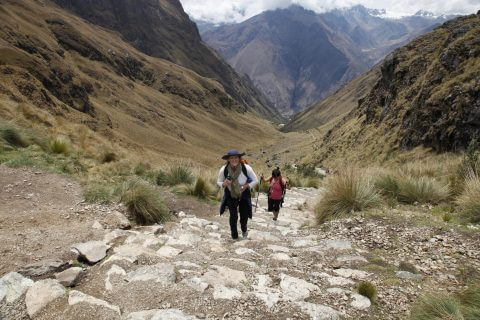
We hiked uphill for four hours straight, stopping often to rest. At our last rest before tackling Dead Woman’s Pass—a grassy meadow with wandering llamas and a vista of peaks poking through a spattering of low-lying clouds—we were greeted by a couple of local women selling soda and candy.
As we started up the trail, Jeb hung back with me while Robb pressed ahead with our oldest Gus, then 12. Still tired, even after downing Cokes, Jeb and I worked out an incentive plan to make it up the steep trail: We’d go 100 steps then stop, rest, and eat two Skittles. A hundred steps, two Skittles. Again and again, gaining ground little by little. With each right step I thought, I don’t want to be the turn-around lady. With each left step, I told myself, I don’t want to be the dead woman.
I worked out an incentive plan to make it up the steep trail: We’d go 100 steps then stop, rest, and eat two Skittles.
Somewhere close to the top, Jeb got a spurt of energy and started sprinting. He passed Gus just before the summit, and I heard people calling, “Come on Gus. Great job, Jeb.” I actually started to cry at that point—partly because I was so moved to hear all those cheers and see the boys accomplish such an incredible feat—but also because my own body was in such damn pain.
I felt about 80 years old as I got closer to the top, and I was thinking that maybe it wouldn’t be so bad to be the turn-around lady. I needed a boost to get myself all the way there, and oddly, childbirth is what popped into my mind. I just kept telling myself: I delivered two babies. Breathe. Breathe. I can do this. I can do this.
And I did. Scowling and weepy, I arrived on top to cheers from Robb and the boys. (Actually, I put out my hand and made Robb pull me the last few steps.) Vincente seemed especially happy and gave me all sorts of high fives. I think it amounted to high 20s or something. When I recovered a bit, I could smile again. And then I couldn’t stop.
So That’s What They Were Thinking
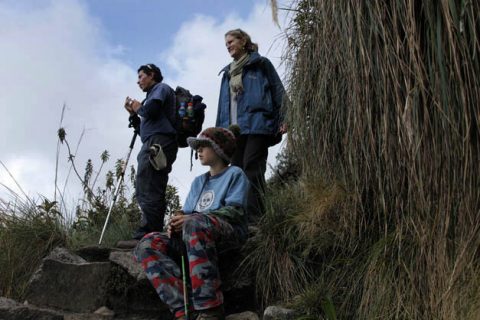
The afternoon brought more challenges. A long steep down-hill from Dead Woman’s Pass that made my creaky knees scream, “You Bitch!” Then another killer climb. The childbirth benchmark didn’t help much that time, since I hadn’t given birth to two babies in one day, dammit. Finally we rested in our tents and rested well.
The next day was rainy and slippery but not too steep so I was fine. The treat at the end of that day—besides a fabulous stone Inca compound that was smaller than Machu Picchu but just as jaw-dropping—was that we camped near a facility with a restaurant, showers (thank God) and massages (orgasmic). The restaurant had beer and so I downed a few, knowing our hike the next morning to Machu Picchu itself was short. I wasn’t worried about a hangover.
On the long steep down-hill from Dead Woman’s Pass my creaky knees screamed, “You Bitch!”
While drinking beer with a group that included our guides Vincente and Oscar, they let us in on something. “There’s usually one person in every group who can’t make it,” Vincente said. “So at the orientation meeting we always try to pick out who that will be.”
I felt blood rushing to my face as I remember the way Vincente and Oscar were looking at me during that first gathering. “Oh my God,” I blurted. “You guys thought it would be me.”
Vincente and Oscar looked at each other and snickered. My face was throbbing at this point. They nodded.
I took in a big gulp of air. I was angry and embarrassed all at once. “Oh no!” I cried. Of course they would pick the oldest woman in the group. I was angry about what was clearly ageism and sexism. I looked at Robb across the table; I’m pretty sure I had tears in my eyes.
“I’m sorry,” Vincente said, putting his hand on my shoulder. “But what does it matter now? You should feel even better about making it. You showed us.” Robb blew me a kiss, and everyone else at the table raised their beers to me with mumblings of “You did it,” and “Congrats.” I gave a half smile and drank with them, a little shaken but happy for the alcohol to calm me.
Here Comes the Sun
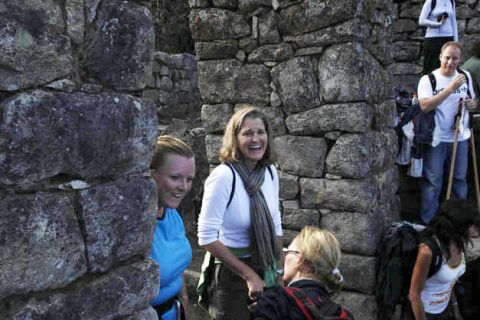
We got up at an ungodly hour the next morning. I was happy to see that the rain and clouds from the day before had cleared. We walked for about 90 minutes, and I found myself buoyant. I might have still had a buzz. But I think it was a bit of pride: I’d defied expectations. The boys almost skipped ahead of the group. We’re off to see Machu Picchu, I kept singing in my head.
I scrambled up the stone steps behind a British woman who had dreamed of laying eyes on Machu Picchu since she saw pictures of it as a young girl.
At about 7 a.m., Vincente pointed at one last uphill. “That’s the Sun Gate,” he said. Arriving at Machu Picchu via the Inca Trail, you first come to the Sun Gate, which is on a pass up above Machu Picchu and was the entrance travelers used during Incan times as they walked to this sacred spot from Cusco over much of the same route we had taken. I scrambled up the stone steps behind a British woman who had dreamed of laying eyes on Machu Picchu since she saw pictures of it as a young girl. At the top of the steps, we only had to turn a corner, around a stone pillar, and the ruins would be spread out below us.
We stepped around the pillar together, and we saw it. Bathed in the first rays of morning sun, with only one cloud drifting by almost like a garnish, Machu Picchu glowed—and so did I.
Love to travel? So do we. Find out more about NextTribe trips, by clicking here.
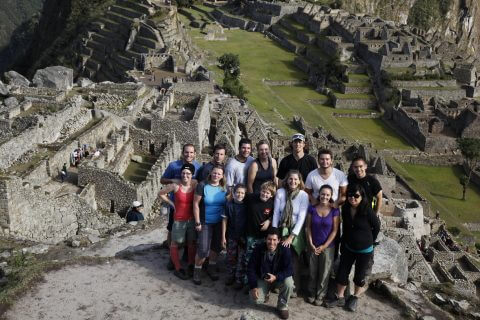
A version of this story was originally published in June 2017.

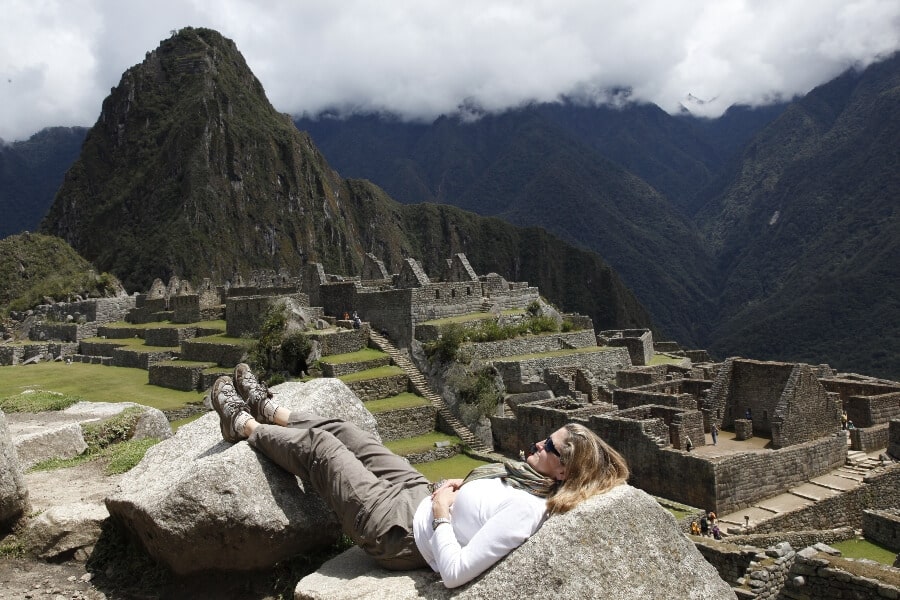

















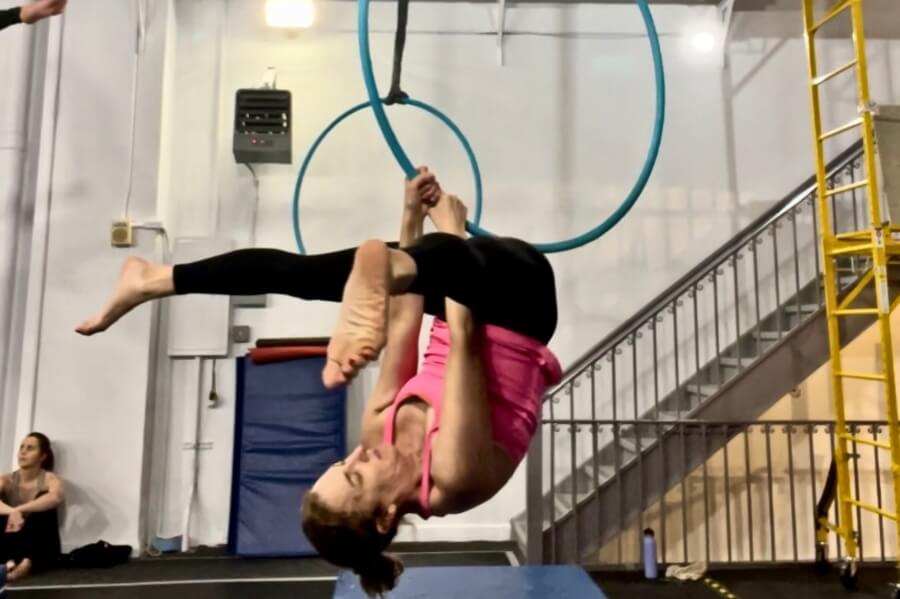
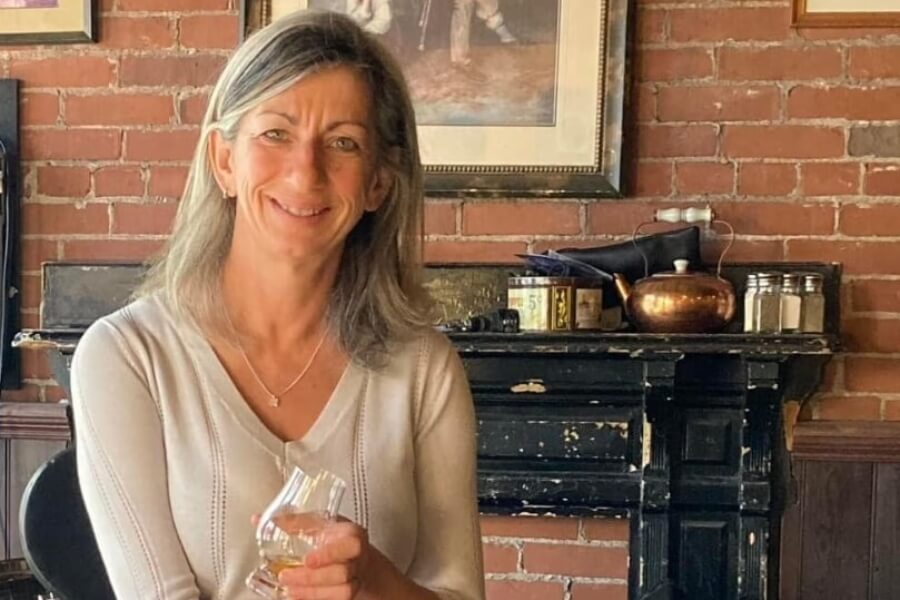
0 Comments